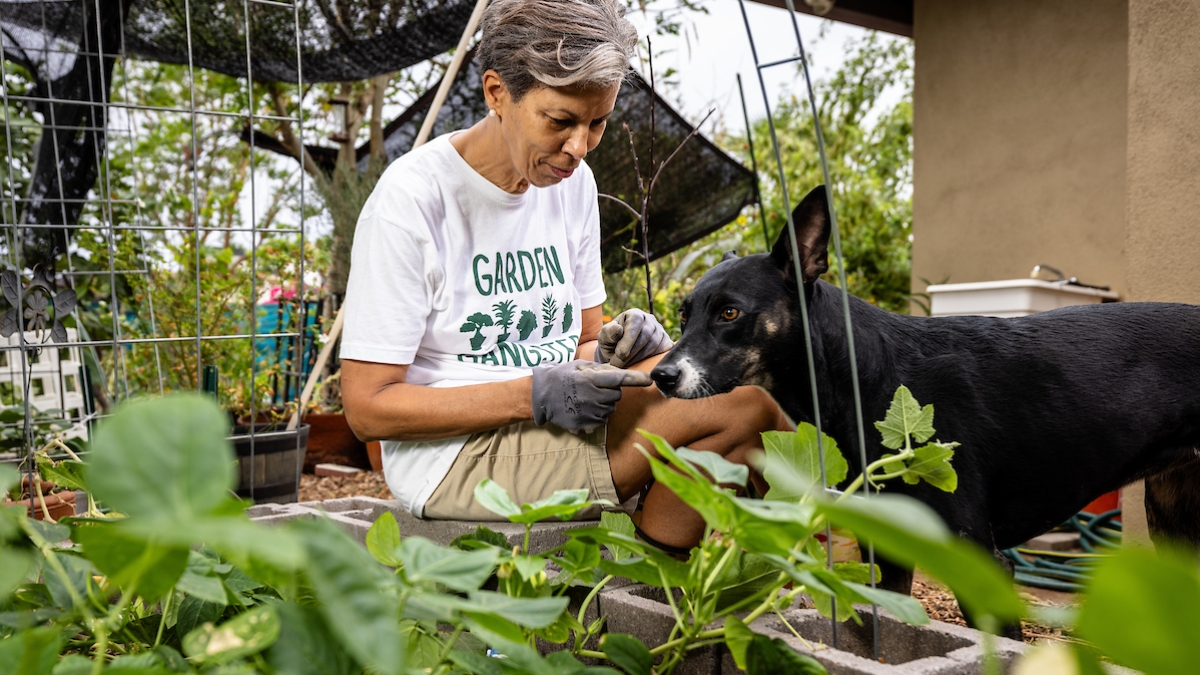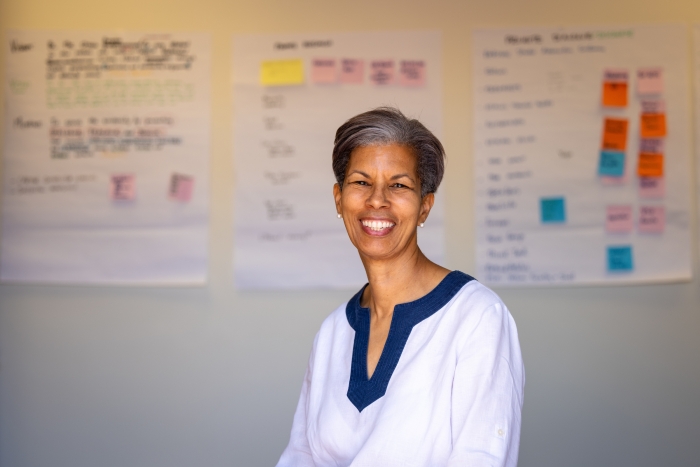The Wright stuff

Col. (Ret.) Wanda Wright gets help from her dog Nakai as she tends her south Tempe garden on Friday, Sept. 1. She is the new director of ASU’s Office for Veteran and Military Academic Engagement and a teaching professor in the College of Integrative Sciences and Arts. Photo by Charlie Leight/ASU News
Editor's note: New Faces on Campus is a monthly feature by ASU News showcasing faculty members who have been hired in the 2022–23 academic year.
Wanda A. Wright served her country with distinction for more than a quarter-century, achieving the rank of colonel when she retired from the Air Force and the Arizona National Guard.
As a third-generation veteran, she gets to serve her country again — this time in a university setting.
It appears to be the perfect match. She has educational, federal, state and military experience, and has been applying her unique blend of skill sets at Arizona State University since June.
Wright is the director of ASU’s Office for Veteran and Military Academic Engagement (OVMAE), a teaching professor in the College of Integrative Sciences and Arts, and most recently, named by the Veterans Administration (VA) secretary to be the new chair for the VA Advisory Committee on Women Veterans and selected to be in the next class of Arizona Veteran Hall of Fame inductees.
She's also a new face on campus this year.
In her new position, Wright will be teaching, networking and promoting existing programs, as well as conducting vital research on veterans’ issues.
ASU News spoke to Wright about her life before and after the military, and the new journey that awaits her.
Question: Can you tell us a bit about your background — where you’re from and how you ended up in academia?
Answer: I grew up in a military family. We moved every two years to a new Army post until I graduated from high school. After graduating from the United States Air Force Academy, I was commissioned and was relocated twice in my military assignments to Myrtle Beach Air Force Base, South Carolina, in 1985, and to Davis-Monthan Air Force Base, Arizona, in 1987. Three years later, I transitioned out of the active-duty military into the Arizona National Guard. I changed positions, on average, every three years while in the Guard. I retired in 2011 after 26 years of service and transitioned into education.
My role in education was as a vice principal and an elementary school teacher for four years. I taught math to sixth graders and middle school students. While there I also applied to ASU to get a master’s degree in educational leadership. I finished the degree during 2015; by then, I had been asked to be the director of the Arizona Department of Veterans’ Services (AZDVS). I spent the next eight years there as director and left the position in 2023.
The combination of all these roles put me in a great position to apply for the director of the Office for Veteran and Military Academic Engagement. I started the new job on June 1.
Q: What is your area of research or academic focus? What are you most excited about regarding your work?
A: I love that I can continue to work with veterans. Working at AZDVS over the last eight years put me in a position to network with a myriad of organizations to support veterans. I am glad I can bring that expertise to ASU. I am excited to work in an academic environment and to do research on veterans. I am looking forward to writing papers around veteran issues and finding solutions for those issues.
Q: When did you realize you wanted to study this field?
A: I always had a feeling I would work at ASU in OVMAE. I assisted the director at the time in 2016 for the program in writing the curriculum for the certificate in study of veterans, society and service. I worked with Nancy Dallett, the assistant director at the time, to begin the process of creating a woodland therapy program. It all came full circle when I was called to tell me I got the job of director.
Q: How do you want to see this field advance to the betterment of society?
A: We are losing veterans every day. It is important to recognize the good and bad of serving in the military so we can figure out how to mitigate the harm of war as much as we can. Each veteran has a story to tell about their experience. Each of these stories added together can give us insight on how to help the next generation of veterans.
Q: What is something you wish more people realized about your work or research?
A: OVMAE is a little-known resource. But the office has great potential to bring knowledge, research and collaboration to ASU and the larger community. Examples include a stronger bond between Veteran Affairs and ASU research, understanding tribal ceremonies and their effect on veteran PTSD or working with the DOD as to why is there a lack of minority leadership in the military.
I also want to note that we bring together the veteran community and ASU to discuss issues around social determinants to include employment, caregivers, mental and physical health. Our programs like Guitars for Vets, Treks4Vets, poetry workshops, employment roundtables and Veterans Voices support keeping the connection and education of veterans at ASU and in the larger community.
Q: What brought you to ASU, and what do you like about the university?
A: Everyone is so helpful. I ask a lot of questions, and everyone is so happy to help.
Q: What specifically would you like to accomplish while at your college/school/department?
A: I would like to make the office into an entity that everyone knows and uses to support discourse, research and teaching those who have served to increase understanding between military, civilian and academic cultures.
Q: What’s something you do for fun or something only your closest friends know about you?
A: I garden and hike. Both hobbies have taught me a lot about how to live sustainably in the world.
More Arts, humanities and education
AI literacy course prepares ASU students to set cultural norms for new technology
As the use of artificial intelligence spreads rapidly to every discipline at Arizona State University, it’s essential for students to understand how to ethically wield this powerful technology.Lance…

Grand Canyon National Park superintendent visits ASU, shares about efforts to welcome Indigenous voices back into the park
There are 11 tribes who have historic connections to the land and resources in the Grand Canyon National Park. Sadly, when the park was created, many were forced from those lands, sometimes at…
ASU film professor part of 'Cyberpunk' exhibit at Academy Museum in LA
Arizona State University filmmaker Alex Rivera sees cyberpunk as a perfect vehicle to represent the Latino experience.Cyberpunk is a subgenre of science fiction that explores the intersection of…
